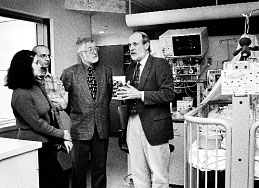Kosovo school is being rebuilt, with help from DMS
Keeping to a schedule that would exhaust most people— meetings, tours, and receptions from early morning until late evening—three recent visitors from Kosovo were determined to absorb as much as possible about Dartmouth Medical School in just a week's time. When Mazllum Belegu, M.D., dean of Kosovo's Pristina Medical School, and two of his medical students, Melihate Mustafa and Valbon Ajazaj, visited Dartmouth in January, they were on a mission: to learn everything they could so they could rebuild their country's medical education and healthcare systems.
Rebuilding: "I hope to learn a lot," said Belegu. "We are rebuilding people first, before rebuilding a hospital."
The Kosovo medical school and health-care system have been in disarray since 1989, when the Serbian parliament dismissed thousands of ethnic Albanian Kosovars, including health-care workers, university professors, teachers, and civil servants. The medical school program went underground.

|
|
The three visitors from Kosovo—from the left, medical students Melihate
Mustafa and Valbon Ajazaj and Dean Mazllum Belegu—met with many
students and faculty at DMS, including, here, neonatologist George Little. |
"The hardest part of the past 10 years was that the medical school buildings were closed," said Ajazaj to a group of DMS students. "We were forced to learn in private houses and elsewhere."
Students had little opportunity for hospital-based clinical training, no access to laboratories or equipment, and only out-of-date textbooks.
Now, thanks to the DMS Kosovo Project—established by DMS Dean John Baldwin, M.D., after he traveled to Pristina last summer at the invitation of the International Rescue Committee (IRC)—as well as to support from the Blessing Way Foundation of New York, DMS will be helping Kosovo revive its only medical school and hospital. James Stickler, M.D., former DMS dean and chair of the IRC board of directors, is heading up the DMS Kosovo Project. He planned a full agenda for the visitors that included touring DMS and DHMC; meeting with Medical Center and College leaders; interacting with DMS students at formal and informal gatherings; attending grand rounds; and meeting with key individuals to discuss primary care, psychiatry, computer and library sciences, and admissions, as well the medical curriculum at various levels.
"The fact that we've been able to come here is especially important, because it's a way to gain new information," said Mustafa. "We are in the first phase of recovering from the oppression and the bombing. This is going to help us see all the possibilities."
The war that ravaged the region from early 1998 to June 1999, culminating in the NATO bombing last spring to drive the Serbs out of Kosovo, resulted in extensive human and material loss. There were, and still are, severe shortages of medical supplies and medical personnel, as well as many public health hazards due, in part, to contaminated water systems.
"We didn't have drinking water with hygienic status," said Mustafa. "We had outbreaks of hepatitis A—1,200 cases— caused by bad living conditions."
Damage: Although the hospital itself was not damaged in the bombing, it was ill prepared to deal with the increased demand for its services. It had been stripped of essential equipment and supplies; anything left was nearly useless due to lack of maintenance. In rural areas, most clinics had been destroyed, which meant people had to either come to Pristina for care or rely on mobile units that traveled the countryside.
"Right now there is no real way to tell what the medical situation is," said Mustafa.
What's more, there are only 14 psychiatrists in the region, while numerous people are suffering from war-induced mental health problems. DMS will help Pristina rebuild its psychiatric program as well as develop its curriculum in other areas.
Plans: Dartmouth will also be working with Belegu to help him meet other pressing needs. Dean Seibert, M.D., an active emeritus associate professor of medicine, has collected 1,000 pounds of medical equipment to ship to Pristina. DMS students are raising money to buy two computers for Kosovar students. And Bill Garrity, director of the biomedical libraries, has negotiated a deal with the MDConsult Web site to provide free access to its services for Pristina students and faculty. DMS also plans to send a number of new medical and nursing texts to Kosovo. Strickler says there are tentative plans to have two DMS students go to Pristina this spring, and for DMS to host two students from Pristina over the summer.
At the end of the January visit, Belegu and his students were pleased with what they had learned. "It's good we can see what the future will look like," said Mustafa, a little tired from her busy week, but still smiling.
Laura Stephenson Carter
If you would like to offer any feedback about this article, we would welcome getting your comments at DartMed@Dartmouth.edu.
